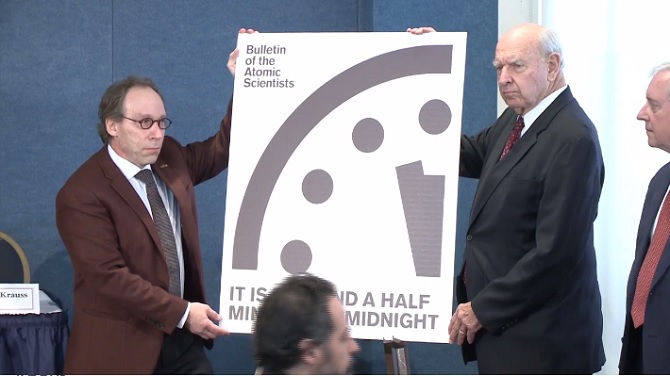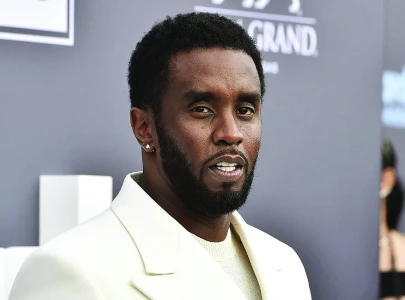
Comments by US President Donald Trump on nuclear weapons and climate change have helped make the world less safe, the Bulletin of the Atomic Scientists warned on Thursday, moving its symbolic "Doomsday Clock" 30 seconds closer to midnight.
The clock - which serves as a metaphor for how close humanity is to destroying the planet - was last changed in 2015, from five to three minutes before midnight.
It is now set at two and a half minutes to midnight, amid concerns about "a rise in strident nationalism worldwide, President Donald Trump's comments on nuclear arms and climate issues, a darkening global security landscape that is colored by increasingly sophisticated technology, and a growing disregard for scientific expertise," said a statement by the group of scientists and intellectuals, including 15 Nobel laureates.
How climate change transformed the world in 2016
Trump has made contradictory statements about climate change, at times calling it a hoax and other times saying he would keep an open mind about it.
On the nuclear issue, Trump said in December that the US must build up its nuclear arsenal.
Responding to a statement by Russian President Vladimir Putin that Moscow needs to strengthen its own nuclear force, Trump responded with a tweet:
The United States must greatly strengthen and expand its nuclear capability until such time as the world comes to its senses regarding nukes
— Donald J. Trump (@realDonaldTrump) December 22, 2016
"The Doomsday Clock is closer to midnight than it has ever been in the lifetime of almost everyone in this room," Lawrence Krauss, chair of the Bulletin's board of sponsors, told reporters at the National Press Club in Washington.
"The last time it was closer was 63 years ago in 1953 after the then Soviet Union exploded its first hydrogen bomb, creating the modern arms race," he added.
"More than that, this is the first time that the words and stated policies of one or two people placed in high positions have so impacted on our perception of the existential threats we believe the world faces," he said, alluding to Trump and Putin.
Imperiling democracy
Krauss cited intelligence reports that accuse Russia of interfering with the US presidential campaign to favor Trump's victory as symbolic of the "deeper global threat" posed by cyber technology.
"The question of whether the fabric of democracy may be imperiled by reducing faith in both the integrity of election and the very information on which an informed public can base their voting becomes suspect," said Krauss, a theoretical physicist at Arizona State University.
He also said the bulletin "is extremely concerned about the willingness of governments - including the current US administration - to ignore or discount some science or evidence during their decision-making process."
Trump looking at fast ways to quit global climate deal
Last year, the warmest year in modern times due to human-driven climate change, world leaders "actually increased the threat of nuclear war and unchecked climate change through a variety of provocative statements and actions including careless rhetoric about the use of nuclear weapons," said Krauss.
An amid escalating rhetoric on the nuclear front, he called on Russia and the United States, which possess the large majority of the world's nuclear weapons, to focus in the coming year on reducing their arsenals.
"President Trump and President Putin, who claim great respect for each other, can choose to act together as statesmen or act as petulant children risking our future," he said.
"Regardless, these issues are too important to be left in the hands of a few men. We therefore call upon all people to speak out and send a loud message to your leaders that you will not allow them to needlessly threaten your future and the future of your children."
In an opinion piece published in the New York Times, Krauss and another bulletin scientist, David Titley, wrote that Trump was a key factor in their decision.
Kremlin says too early to react to Trump nuclear cuts offer
"Never before has the Bulletin decided to advance the clock largely because of the statements of a single person," they wrote.
"But when that person is the new president of the United States, his words matter."
The Doomsday Clock was created in 1947. It has changed 19 times since then, ranging from two minutes to midnight in 1953 to 17 minutes before midnight in 1991.

















COMMENTS (3)
Comments are moderated and generally will be posted if they are on-topic and not abusive.
For more information, please see our Comments FAQ